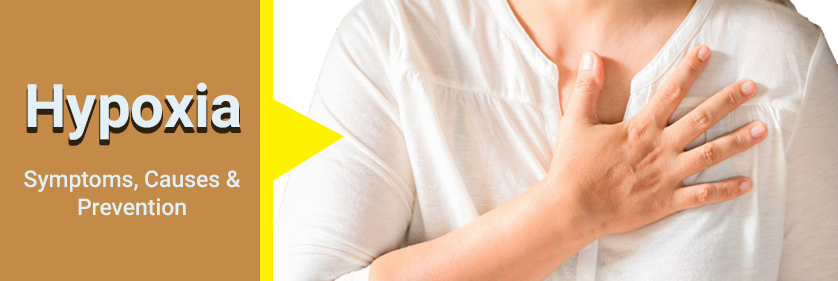Hypoxia- Symptoms, Causes and Prevention
What is Hypoxia?
Hypoxia is a medical condition in which tissues (especially the brain and other vital organs) do not get enough oxygen and may be the product of hypoxemia, a disorder in which the oxygen and saturation levels are low in the bloodstream. Hypoxia is dangerous because it can cause irreversible damage to vital organs, and if not treated quickly enough, it can be fatal. Here we are discussing the hypoxia and its Symptoms, Causes and Prevention tips.
Know that hypoxia and hypoxemia are two different conditions although the spellings are similar. Hypoxemia is a disease in which the red blood cells are greedy for oxygen and this may cause hypoxia over time, a disease in which the tissues lack enough oxygen to function.
What are the symptoms of hypoxia and hypoxemia?
The signs of hypoxia and/or hypoxemia may be either chronic or acute.
Acute symptoms will quickly develop and typically consist of:
- Shortness of breath,
- Rapid breathing, and
- A fast heart rate.
Certain associated signs that may be present in both acute and chronic hypoxia and hypoxemia include:
- Wheezing
- Sweating
- Coughing
The person affected may initially be slightly confused and appear frail or may experience sudden changes in skin colour ranging from blue to cherry red (depending on the causes).
Severe symptoms seen with cerebral hypoxia include:
- Confusion,
- Inability to communicate,
- Coma, and
- May result in death.
The symptoms in pediatric patients can be similar to the above and may include the following:
- Lethargy
- Irritableness
- Anxiousness
- Inattentiveness
- Sitting up and leaning forward to improve diaphragmatic breathing
- Children with epiglottitis and restrictions on the airways may drool and breathe mainly by mouth.
When to seek medical attention?
You should seek medical treatment immediately. The health care provider will treat hypoxia immediately, because a lack of oxygen to the tissues and organs may cause severe complications.
Causes of Hypoxia
Usually, hypoxia is caused by hypoxemia, which is when the blood has low oxygen levels. The blood normally brings oxygen to your tissues, but your tissues suffer when your blood doesn’t have enough oxygen and your body begins shutting down. The term hypoxia is often used to identify any of these conditions — the lack of oxygen in the blood and tissues.
A serious asthma attack and other conditions that make it difficult to get oxygen to the lungs can also cause hypoxia. This may include:
- Lung disease — COPD, emphysema, pneumonia, etc.
- Heart problems
- Anemia
- Cyanide poisoning
- Good treatment for pain, and other breathing-impact medications
What are the Complications of Hypoxia?
Hypoxia is a serious condition and must be taken in mind timely. Ignored cases of hypoxia may cause severe and lasting adverse health effects, or even death. Different complications include:
- Cerebral injury and paralysis
- Due to gangrene, death of body tissues
- Heart arrest
Preventing Hypoxia
Another best way to avoid hypoxia is every day to keep your asthma underhand. Keep in with your treatment plan for asthma.
- Take your medication to help avoid flares and use your inhaler for rescue.
- Eat well and stay healthy.
- Learn what causes your asthma, and find ways to stop it.
Consult with the doctor to come up with an asthma attack action plan, so that you know what to do when you have breathing problems.
There are also some ways to avoid hypoxia. One approach involves increasing barometric pressure to a minimum value, such that oxygen saturation is adequate to avoid the occurrence of hypoxia. Typically this is achieved by pressurizing the cabin of the aircraft. The other approach is by using an O2 tool to increase the breathable oxygen in a system. Normally this is done with a pilot wearing an oxygen mask. The techniques can also be combined to provide greater assurance that hypoxia is avoided.
